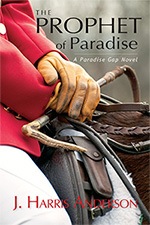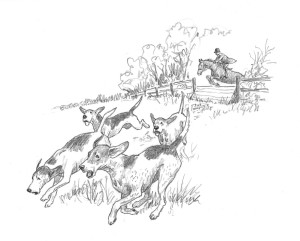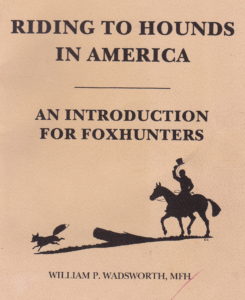Legacy Rape: Promotional messages created by developers that rely on images of a foxhunting past rendered obsolete by the creation of the promoted development.
Preservationist: Someone who built his house last year.
From the late 1920s through the mid-1960s the Fairfax Hunt actually hunted in Virginia’s Fairfax County. When I was growing up in the 1950s and ‘60s Tyson’s Corner was a feed and grain store and a one-pump gas station (Sinclair gas, with Dino the Dinosaur). Decades later, when the club decided to start a website, we discovered that “www.FairfaxHunt.org” was already taken—by a freakin’ homeowners association in the Colchester area of the county called “The Fairfax Hunt.” The cookie-cutter houses in this enclave of suburban bliss sit along Fairfax Hunt Road, Fox Run, Saddle Horn Drive, and Crupper Place. (Someone sure did his homework about hunting tack to come up with those last two. Whoever suggested “Crupper” must have been a real horse’s ass.)
This is a prime example of what I call “Legacy Rape”: The trend to pave over sections of hunting country, build residential communities or commercial centers, and then use the allure of foxhunting to market these monstrosities.
 In the Gainesville area of Northern Virginia there is a new adult community (no young families with children allowed) built on land that was once Bull Run Hunt’s territory. Named Heritage Hunt, it is a place completely devoid of heritage where no one is allowed to hunt. Furthering the insult, you can sign up for special privileges on the golf course, which makes you a member of the Hunt Club. Perhaps this refers to searching for errant golf balls in the rough.
In the Gainesville area of Northern Virginia there is a new adult community (no young families with children allowed) built on land that was once Bull Run Hunt’s territory. Named Heritage Hunt, it is a place completely devoid of heritage where no one is allowed to hunt. Furthering the insult, you can sign up for special privileges on the golf course, which makes you a member of the Hunt Club. Perhaps this refers to searching for errant golf balls in the rough.
 Along Rt. 50 near Chantilly in Fairfax County stands a sign announcing the planned creation of something called Foxgate Town Center. No town named “Foxgate” exists so just why this imagined locale needs a center is a matter of speculation. The logo consists of a jaunty, anthropomorphized fox clad in hunting attire—scarlet coat, stock tie, boots and breeches—and holding a bugle. This stylistic error is telling in an unintended way: it brings to mind the image of the cavalry charging in, uprooting the current residents, and reshaping the land to suit someone else’s agenda. Only this time the invaders aren’t on horseback; they’re driving bulldozers.
Along Rt. 50 near Chantilly in Fairfax County stands a sign announcing the planned creation of something called Foxgate Town Center. No town named “Foxgate” exists so just why this imagined locale needs a center is a matter of speculation. The logo consists of a jaunty, anthropomorphized fox clad in hunting attire—scarlet coat, stock tie, boots and breeches—and holding a bugle. This stylistic error is telling in an unintended way: it brings to mind the image of the cavalry charging in, uprooting the current residents, and reshaping the land to suit someone else’s agenda. Only this time the invaders aren’t on horseback; they’re driving bulldozers.
Spend a few hours cruising through Northern Virginia and you’ll spot many more examples of equestrian and countryside themes usurped to sell the very structures that now make the horse-centered life nothing more than a romantic memory. There’s a host of developments with the word “Farm” appended to the name. According to my old Webster’s, a “farm” consists of “a tract of land devoted to agricultural purposes or to the raising of animals, especially domestic livestock.” I don’t think begonias and golden retrievers qualify as “agriculture” and “livestock.” The word “farm” can also be applied to an area containing a number of similar structures or objects, such as an oil storage tank farm. So I suppose in that sense referring to a cluster of cookie-cutter homes in the same way one would describe a collection of containers for petrochemicals is fully appropriate.
This is emblematic of the overall trend to employ words and images that convey a sense of rusticity when the reality is a sanitized landscape from which everything even remotely rustic has been removed.
The following words should henceforth be banned from use in the names of home models, residential communities, golf courses, business centers, or any other development where equestrian activities or agricultural pursuits have been rendered impossible:
Hunt •Chase • Fox • Farm • Pasture • Meadow • Field • Paddock • Barn • Stable • Ride/Riding • Saddle • Bridle • Canter •Gallop • Estate • Acres
Strike them from the marketer’s lexicon, delete them as options for descriptive copy that would paint an enticing but fallacious image of a project’s true personality.
Also forbidden are images of foxes, real or cartoon-like. No photos or paintings of hunt scenes are allowed. Elements of foxhunting such as a cap, whip, scarlet coat, brown-topped boots, or horn (including erroneous depictions of bugles) are not to appear.
Violations of these restrictions should be punishable by a stiff fine and lengthy incarceration
I’m thinking the fine proceeds should go to a fund for retired foxhounds. And that lengthy incarceration should consist of confinement with a psychopathic bulldozer operator who smells of diesel fuel and wants to see everything in his cell flattened, including his legacy rapist cellmate. This would assure, in the words of Gilbert & Sullivan’s Mikado, that the punishment fits the crime. Who’s with me?
 For more amusing tales from Paradise Gap, click on the Books link above and check out The Prophet of Paradise, a tale of foxhunting, faith, and pheromones.
For more amusing tales from Paradise Gap, click on the Books link above and check out The Prophet of Paradise, a tale of foxhunting, faith, and pheromones.



